A unique story
It is 1816. Around a game table, the Bishop of Perpignan faces an engineer from the Ponts et Chaussées, Raymond Etienne Amiel. The clergyman then wagers one of his lands, the Goudous estate, which he ends up losing: the estate changes hands and becomes the property of the aptly named Amiel. A true story. At that time, the property consisted of 10 hectares of vines in the heart of the garrigue.
By the end of the century, the phylloxera vastatrix destroyed nearly the entire French vineyard. Camille Gouzy, a wine merchant and producer in Millas, partners with Amiel’s son and proposes to the winemakers of the Agly Valley to replant their vineyards using American vine species. He builds a cellar with about twenty large oak casks on the Mas estate. His reputation crosses borders, and when Portugal is also struck by phylloxera, Camille Gouzy is invited to replant the vineyards in the Douro Valley.
In 1907, following some management mistakes, Mas Amiel is taken over by the banker Charles Dupuy, who will ensure its development until his death. In 1916, his son Jean takes over upon his return from the war. It is he who will develop and produce a natural sweet wine under the Mas Amiel brand (pictured below). His son Charles will continue this expansion policy until 1997, the year of his passing.
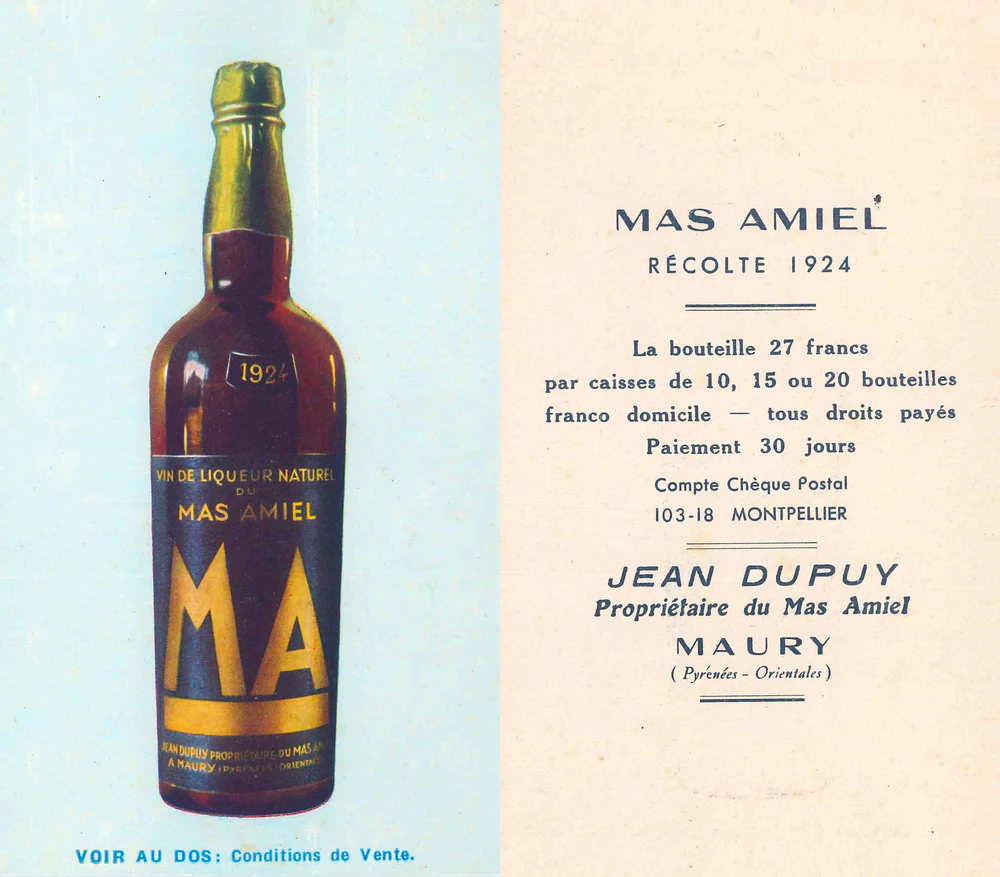
In 1999, Olivier Decelle discovered Mas Amiel and acquired the 226-hectare estate, 155 hectares of which were planted with vines. At that time, the production mainly consisted of Vins Doux Naturels, but Olivier Decelle was convinced of the potential of dry wines.
In 2002, Nicolas Raffi, a young oenologist freshly graduated from the University of Montpellier, joined the estate. Upon his arrival, the vineyard adopted the farming practices of organic agriculture and biodynamic farming (certified in 2017 and 2020, respectively). Under Olivier Decelle’s guidance, the production of dry wines was launched, with the ultimate goal of gaining supreme recognition from the INAO (the Maury Sec appellation would be officially created in 2011).
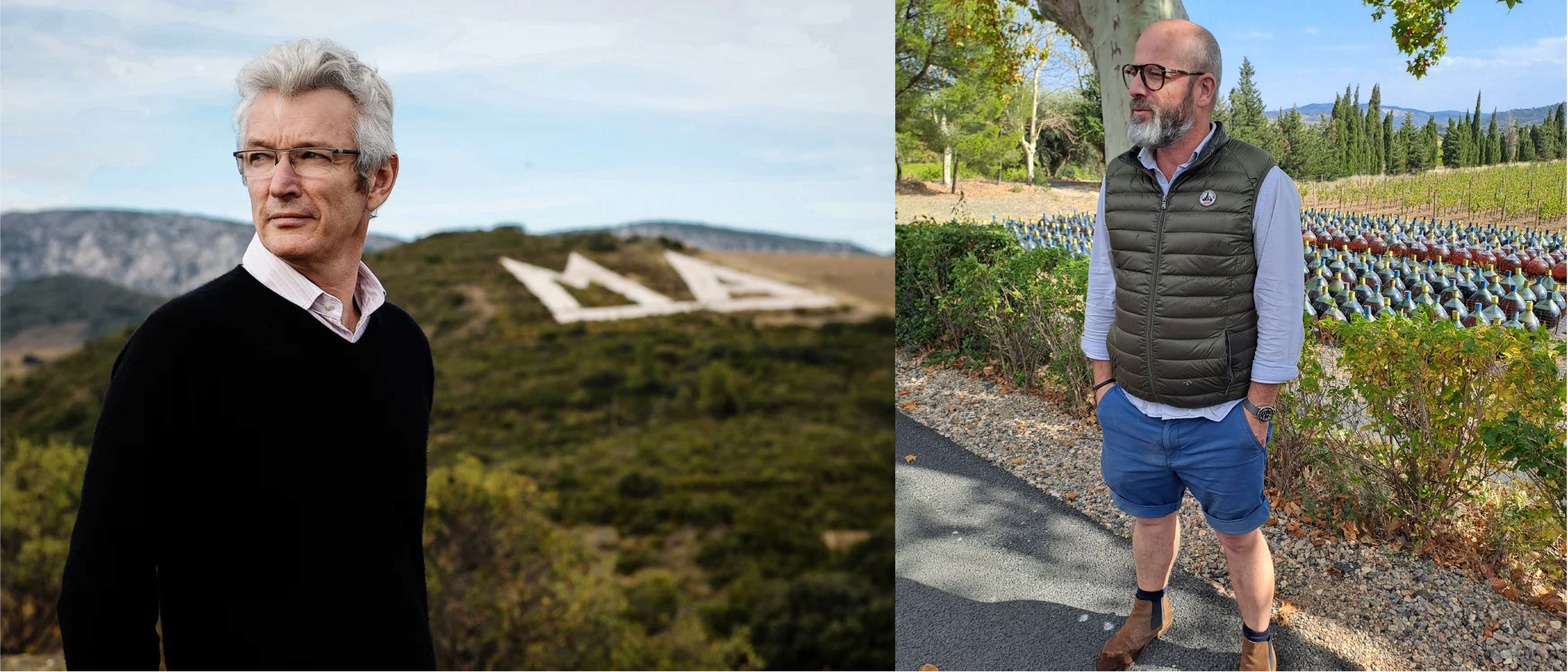
A unique terroir
Mas Amiel is located in the Agly Valley. Surrounded by two limestone massifs, the parcels of Mas Amiel are exceptional. Mostly facing southeast, the vineyard is relatively shielded from the scorching summer heat. The valley’s orientation allows the circulation of cold air from the Pyrenees, ensuring good health during the growing phase. An exceptional location indeed, but it would be nothing without the famous calcoschist! This metamorphic rock, specific to the Agly Valley (as it disappears near Saint-Paul-de-Fenouillet and Caudiès-de-Fenouillèdes), is naturally clayey shale, which imparts an almost tannic character, even "cutting" on the palate, but it also contains a large fraction of active limestone, often associated with acidity and salinity in the wines. This is the observation made by the custodians of the estate, and we gladly share it during the wine tastings.
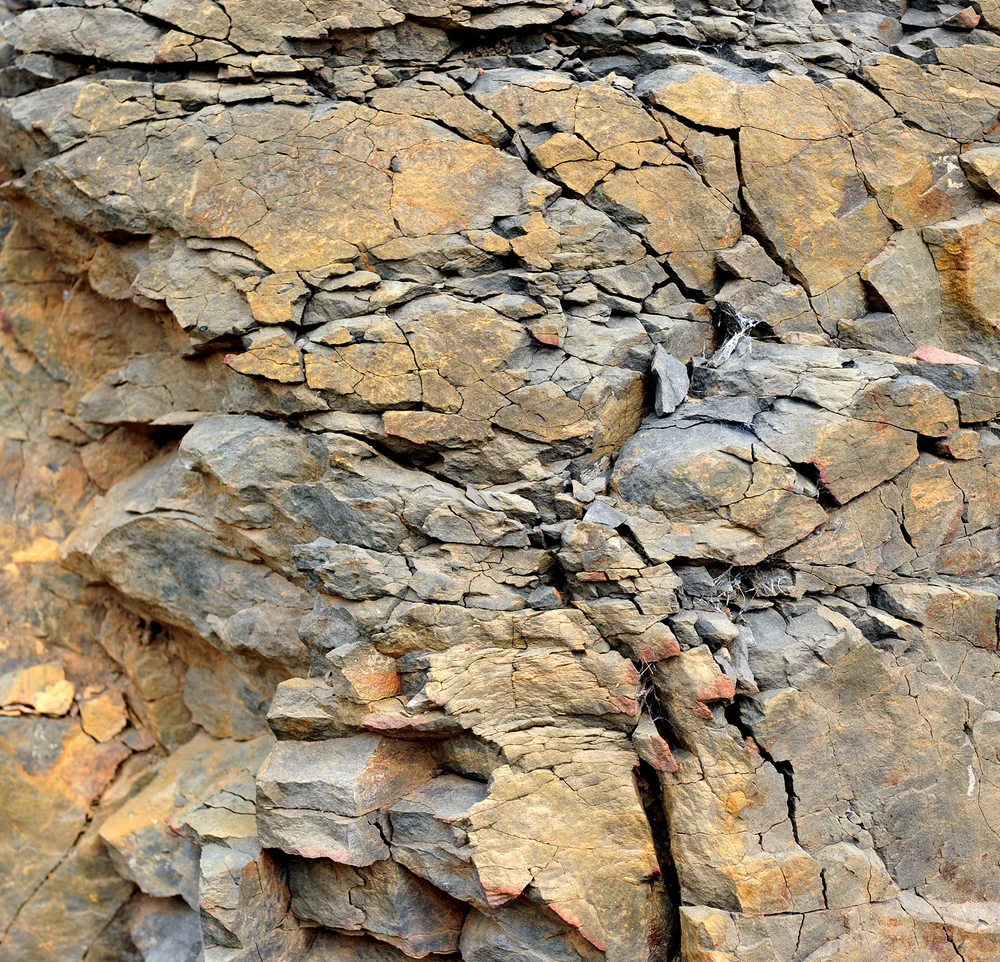
Enlightened winemaking
Indigenous yeasts and sulfur-free vinification are practiced at the estate, with cold storage for the first 5-6 days while the fermentations begin. This is followed by malolactic fermentations, then aging on lees, always without sulfites, which encourages the emergence of more complex aromas. The absence of sulfites until April also limits the combination of SO2 when added initially, which allows the wine, once bottled, to retain much of its brightness and energy. The basic principle is that once the pruning shear has been applied, any action degrades the initial potential. However, Nicolas Raffi regularly conducts analyses to monitor the wines' progress. Here, "non-interventionist" practices are chosen to make the wine better, not to satisfy a pseudo-philosophy of the enlightened. Even the most free vinifications are constantly guided by science.
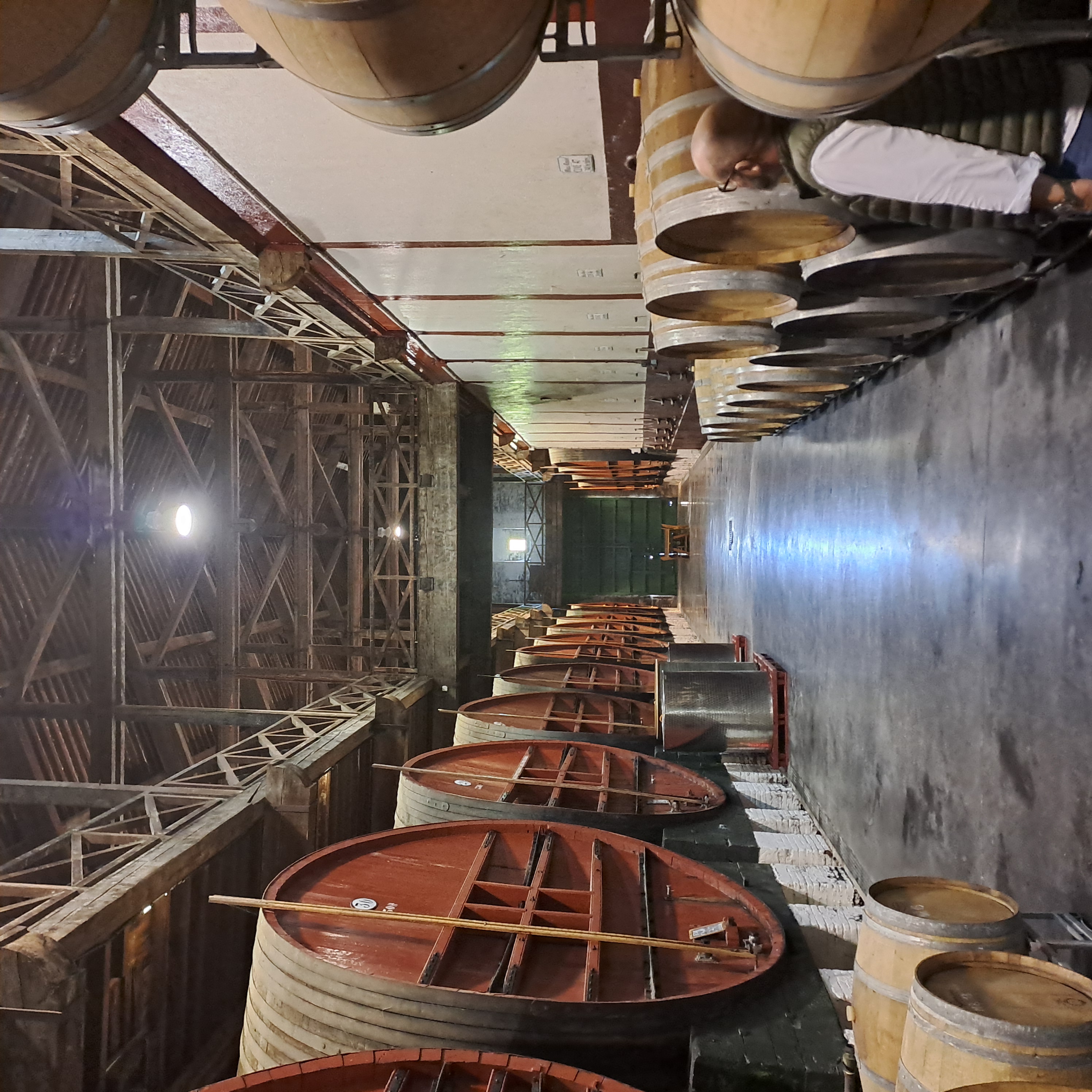
Wines at their peak
Not that they are ready to drink, but rather that they have reached a certain style, regardless of the range. First, the wines called Natural—primarily because they are sulfur-free—are remarkable for their precision and authenticity. This means natural balances and textures that seem effortless, without any detectable human intervention. Add to this a luscious fruitiness that is almost "sweet" (the wines are bone-dry) but never overly ripe, combined with a schist-like savoriness oscillating between tannicity and salinity, and finally brilliant, original aromas, and you have one of the best value-for-money wines in France.
Next comes the parcel selection range, which includes our favorite, Altaïr 2023. A blend of 70-year-old Grenache Gris, Grenache Blanc, and Macabeu grown on calcoschist (yes, them again!) and vinified primarily in stainless steel tanks—this is the most German of Roussillon wines! Strikingly similar to a Rheingau Riesling, Altaïr boasts a richness and schist-driven flavor that lend it exceptional aging potential.
Finally, among the Grandes Cuvées, we find L’Oiseau Rare, a stunning Grenache-dominant bottle where elegance and finesse triumph over power.
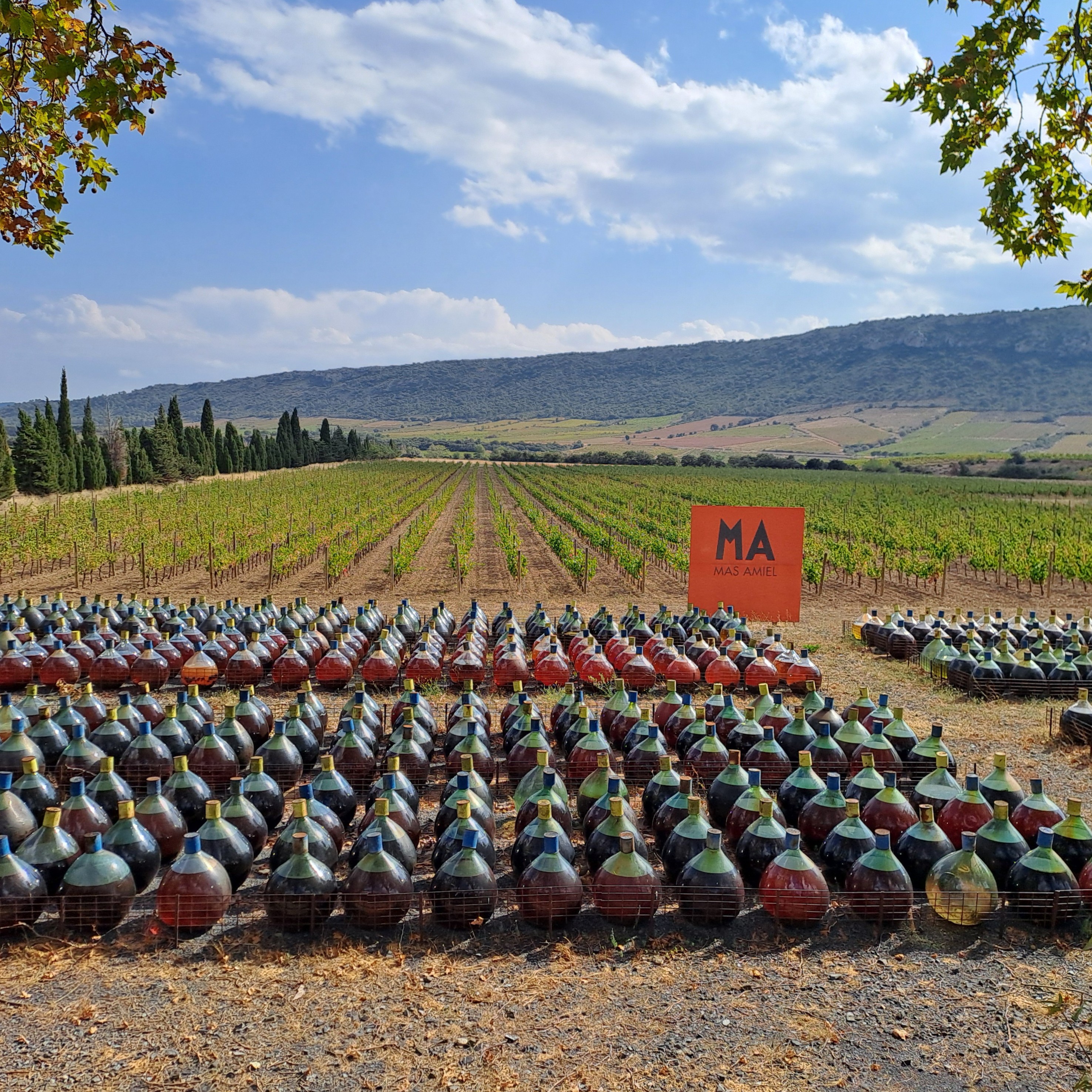
A (re)discovery
If you’re already familiar with Mas Amiel’s Vins Doux Naturels, you’ll appreciate rediscovering them: fresher, more precise, and even saltier than before. If you’re new to their dry wine range, don’t hesitate to buy some. At this price, it’s hard to miss out on the experience of a tasting that reveals as much about the great wines of Roussillon as it does about the stunning landscapes of the Agly Valley. See our tasting notes below.
Olivier Borneuf
Côtes-du-Roussillon Cuvée Natural 2023
Côtes-du-Roussillon Cuvée Altaïr 2023
Maury-Sec Cuvée Oiseau Rare Millésime 2022
Maury-Sec Cuvée Alt. 433M Millésime 2023
Maury Cuvée MA 40 ans d'âge
Maury Cuvée M’70 Millésime 1970
Maury Cuvée MA'80 Millésime 1980
Maury Cuvée MA'99 Millésime 1999
